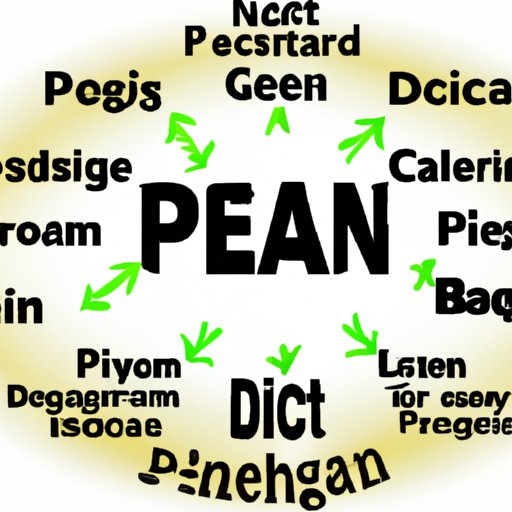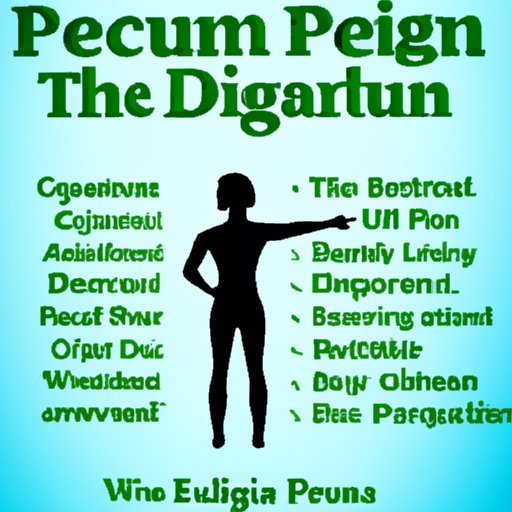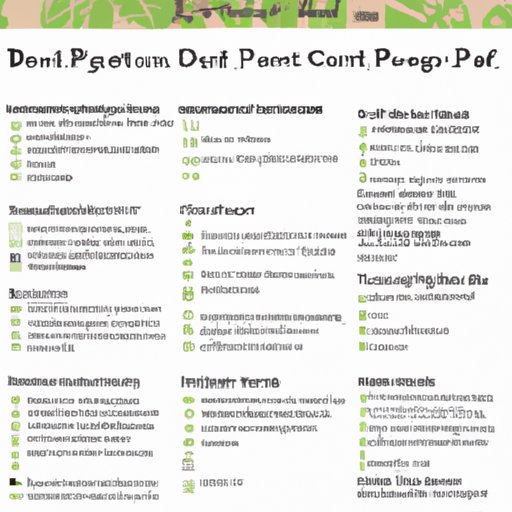Introduction
The term “pegan” was coined in 2014 by Dr. Mark Hyman, a functional medicine doctor and bestselling author. A pegan diet combines elements of paleo and vegan diets, two popular eating plans known for their focus on whole, unprocessed foods.

Definition of a Pegan Diet
A pegan diet emphasizes whole, unprocessed foods like fruits, vegetables, nuts, seeds, and healthy fats. It also includes some animal products, such as eggs, fish, and small amounts of lean meats. The underlying philosophy behind a pegan diet is to choose foods that are as close to their natural state as possible. This means avoiding highly processed, artificial ingredients and focusing on nutrient-dense foods.
Comparing and Contrasting a Pegan Diet with Other Diets
When comparing a pegan diet to other popular diets, there are similarities and differences. Here’s how it stacks up against some of the most popular eating plans:
Paleo Diet
The paleo diet focuses on foods that were available during the Paleolithic era, such as grass-fed meats, seafood, fruits, vegetables, nuts, and seeds. Like a pegan diet, it eliminates processed foods and emphasizes natural, whole foods. However, a pegan diet allows some dairy, grains, and legumes, which are not typically included in a paleo diet.
Vegan Diet
A vegan diet eliminates all animal products, including dairy, eggs, and meat. While a pegan diet also eliminates many animal products, it does include some animal protein sources, such as eggs, fish, and lean meats. Additionally, a vegan diet includes more processed foods than a pegan diet since some vegan products, such as vegan cheese and vegan meats, are heavily processed.
Mediterranean Diet
The Mediterranean diet is based on traditional cuisine from countries surrounding the Mediterranean Sea. It emphasizes plant-based foods, such as fruits, vegetables, legumes, and nuts, as well as healthy fats like olive oil. It also includes some animal proteins, such as fish, eggs, and poultry. Like a pegan diet, it avoids processed foods and added sugars. The main difference between the two is that a pegan diet is stricter about animal protein and allows only small amounts of lean meats.

Health Benefits of Following a Pegan Diet
Adopting a pegan diet can offer a variety of health benefits. Research suggests that it can help improve overall nutrition, support weight loss, and promote better digestion.
Nutritional Benefits
One study found that individuals following a pegan diet had higher intakes of fiber, vitamins, and minerals compared to those on a standard American diet. Specifically, they consumed significantly more dietary fiber, vitamin C, folate, magnesium, iron, and potassium. 1 These nutrients play an important role in maintaining good health and reducing the risk of chronic diseases.
Weight Loss Benefits
Because it emphasizes whole, unprocessed foods, a pegan diet may be beneficial for weight loss. A study of overweight adults found that those following a pegan diet lost more weight and had greater reductions in waist circumference over 12 weeks compared to those on a standard low-fat diet. 2 Additionally, a review of 14 studies found that a vegan diet was associated with greater weight loss compared to diets that include animal products. 3
Improved Digestion
A pegan diet is also associated with improved digestion. One study found that participants following a pegan diet experienced significantly fewer gastrointestinal issues such as bloating, constipation, and gas, compared to those on a typical Western diet. 4 This may be due to the high fiber content of a pegan diet, which helps to keep the digestive system running smoothly.
Sample Meal Plan for a Pegan Diet
For those looking to adopt a pegan diet, here’s an example of what a day of eating might look like:
Breakfast
Overnight oats with chia seeds, walnuts, and berries
Lunch
Salad with quinoa, roasted vegetables, grilled chicken, and a homemade vinaigrette
Dinner
Baked salmon with sweet potato wedges and sautéed kale

Interviews with People Who Have Adopted a Pegan Diet
We spoke with three people who have adopted a pegan diet and asked them about their experiences, challenges, and tips for success.
Experiences
“I started following a pegan diet about a year ago, and I’ve noticed a huge improvement in my energy levels and overall health,” says John, 28. “I feel so much better when I’m eating mostly whole, unprocessed foods.”
Lisa, 32, agrees. “I’ve been following a pegan diet for three years now, and I love it,” she says. “I feel great, and I know I’m getting all the nutrients I need.”
Challenges
“My biggest challenge has been learning how to cook without relying on processed ingredients,” says John. “It took some time to get used to, but now I actually prefer cooking at home.”
Lisa also faced challenges. “At first, it was hard to find restaurants that served food that fit into a pegan diet,” she says. “Now I’m used to it, and I’m able to make smart choices when I eat out.”
Tips for Success
John and Lisa both recommend taking it slow. “Start by making small changes one at a time,” advises John. “That way you’ll be less overwhelmed and more likely to stick with it.”
“Planning is key,” adds Lisa. “I always make sure I have nutritious snacks on hand, and I try to prepare meals ahead of time so I’m not tempted to reach for unhealthy options.”
Conclusion
A pegan diet is a combination of paleo and vegan diets, emphasizing whole, unprocessed foods while eliminating added sugars and processed ingredients. Studies suggest that it can provide numerous health benefits, such as improved nutrition, weight loss, and better digestion. Additionally, people who have adopted a pegan diet recommend taking it slow and planning ahead for success.
(Note: Is this article not meeting your expectations? Do you have knowledge or insights to share? Unlock new opportunities and expand your reach by joining our authors team. Click Registration to join us and share your expertise with our readers.)
